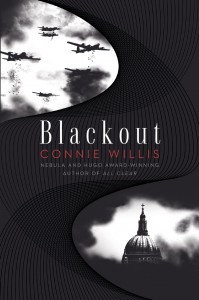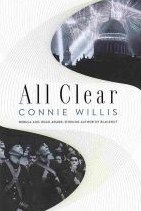Hugo Awards Reading Report 5: The Novels—“Blackout” and “All Clear” by Connie Willis
 The Hugo Award reading process has been fast-paced and pressured, with six major novels to be gotten through between 1 July, when I finished work on The Gathering of the Lost The Wall of Night Book Two, and tomorrow, 31 July, when the voting closes. But here it is, squeaking in under the wire, my final report back on Connie Willis’ Blackout and All Clear, which as one story published in two parts comprises two books being considered as one for the purposes of the award.
The Hugo Award reading process has been fast-paced and pressured, with six major novels to be gotten through between 1 July, when I finished work on The Gathering of the Lost The Wall of Night Book Two, and tomorrow, 31 July, when the voting closes. But here it is, squeaking in under the wire, my final report back on Connie Willis’ Blackout and All Clear, which as one story published in two parts comprises two books being considered as one for the purposes of the award.
Those of you who have been following these reports will be familiar with my evaluation criteria by now. But for others coming new to it all I have set the criteria out in full at the end of the post (below the complete list of finalists for the award.) Any specific considerations that come up for me in relation to a specific work I mention within the body of the report.
 Blackout and All Clear by Connie Willis.
Blackout and All Clear by Connie Willis.
The Basic Story:
In Blackout/All Clear, Connie Willis has returned to the world of her award-winning novel, Domesday Book, in which historians based in Oxford are able to use time travel to observe past events at first hand. In this case the three central protagonists, Polly, Mike, and Eileen (Merope), time travel back to World War 2 to observe events around Dunkirk and the London Blitz first hand. But “slippage”, the feature of time travel that is supposed to help prevent history from being changed by the intrusion of observers from the future, is growing worse and then Polly, Mike and Eileen’s drop points refuse to reopen, stranding them in the horror of the Blitz. As events unfold, they begin to suspect the worst, which is that the slippage and stranding may have happened, not to prevent them from changing the past but because their actions have already changed it—that they may in fact have caused the war to be lost.
Meanwhile, back in Oxford, two of the characters we first met in Domesday Book, Mr Dunworthy and Colin Templar, who is in love with Polly, are desperately trying to get the drops to re-open and pull the three trapped historians out of the past.
The Report:
The summary above is the speculative plotline of Blackout/All Clear, but when all is said and done, this story is really about the two phases of the Blitz, the bombing raids of 1940-41 and the “doodlebug” rocket attacks of 1944—a “praise song”, as it were, to the courage and fortitude of the Londoners who not only survived those terrible events, but kept going and fought back and won the war. So Blackout/All Clear is as much an historical novel as it is a speculative fiction one.
Overall, I believe it is probably a stronger historical than speculative fiction work, simply because the SFF element—ie whether time travel has actually caused the Allies to lose the war, and will the time travel drops re-open in time to save Mike, Polly, and Eileen?—is actually quite slight for the approximately 1200-page length of the two novels. For me, this was really more the background of the novel, something that worried and drove the three central protagonists but did not greatly concern me as a reader.
This is because, as a reader, I “knew” that somehow or other the course of history had to work out (ie from the beginning, I never had the sense that this was going to turn into a true “alternate history” novel.) This sense was reinforced by the use of the character of Colin Templar from the earlier novel, Domesday Book, as the young man driven to find Polly. I already knew from the earlier work that Colin was creative and resourceful and therefore likely to succeed. You also may recall from my first report on The Hundred Thousand Kingdoms that I claimed to be rarely surprised by the twists and turns in stories. In this case I can fairly say that I was able to predict the reason for slippage and the closure of the drops (which is the resolution of the story for the central characters) from a fairly early stage. So from a speculative point of view, I felt that the story was actually quite “slight.”
The strength of Blackout/All Clear lies in the convincing depiction of the historical period and the depth of the characters. Polly, Eileen and Mike were all engaging personalities that I cared about emotionally—although that emotional engagement might have been more profound if I had felt more uncertainty about the final resolution of the story. And then there were the Hodbin children, Alf and Binnie, whose paths kept intersecting Eileen’s, and through her those of the other time travellers. These were no cute, engaging kids but quite the opposite: they were utterly convincing little horrors–and for me, the the two most compelling characters in the book, not just because they were so real but because as genuine citizens of World War 2, their future was less certain than that of the three central characters.
As I said at the beginning, this was really a story, not so much about time travel and the three central characters, but about the Blitz and the war and the courage and fortitude of the Londoners who endured that time—and by so doing bought us the future that we enjoy today. It contains a wealth of detail of the events and the people that lived through them: air raid wardens, rescue workers, ambulance drivers, doctors and nurses, shop girls, school children, civilians—but every one of them making a difference. The three time travellers were interesting and sympathetic, but mainly as a lens onto the WW2 events and people amongst whom they moved in the story. And for me, it is the “praise song” element that gave Blackout/All Clear its life and power, and which kept me engrossed in the 1200-odd page read—not the speculative storyline or character studies (the Hodbins aside.)
And in case of doubt, as an avid reader of both historical fiction and non-fiction, this book did hold my attention throughout.
—
To reiterate, the complete list of finalists for the Hugo Award for Best Novel, by book title, comprises:
- Blackout/All Clear by Connie Willis (Ballantine Spectra; Allen & Unwin here in AU/NZ)
- Cryoburn by Lois McMaster Bujold (Baen) – you can read my report here
- The Dervish House by Ian McDonald (Gollancz; Pyr) – again, you can read my report here
- Feed by Mira Grant (Orbit) – my report is here
- The Hundred Thousand Kingdoms by N.K. Jemisin (Orbit) – my report is here
The evaluation criteria I have been using for all the Best Novel finalists are as follows:
– the use of genre elements in the work, i.e. its strength as a work of speculative fiction;
– whether the book works for me as a story, i.e. is it compelling, well written and engaging, with particular regard to the emotional depth to the story telling and interesting ideas (although not necessarily for their own sake.) Consistency of both characters and plot is really important to me. And I do rate good use of humour in the story.
– It has also emerged through my previous reports that I appreciate a good ‘twist in the tale’, although I don’t actively require it to enjoy a book—good characters and a good tale well told are my baseline.
The Next Step:
And now, having read and reported back on all six novels on the shortlist for the Hugo Award for Best Novel, I am faced with the difficult and daunting task of deciding how to order them on my ballot. I’ll be doing that tomorrow and reporting back on how the process went—but only after the voting has closed!
In the meantime, what do you think—how do you think I might vote having read my reports on each and all of the books? And if you’ve read any or all of them yourself, how did you feel about the story/stories?








Loved your reports. The Dervish House and 100K have me most intrigued, personally…
Hey, I’m glad you liked the reports. And The Dervish House and The Hundred Thousand Kingdoms are both strong contenders for my ‘top spot.’